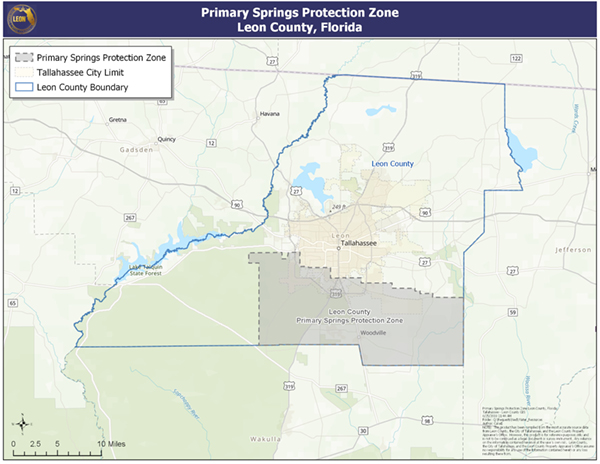Primary Springs Protection Zone
The water quality and biological health of Wakulla Springs and the Upper Wakulla River have declined over the past several decades. As experts began researching the reasons for the decline, Leon County adopted the Primary Springs Protection Zone into its Land Development Code in 2007. The Primary Springs Protection Zone covers a significant portion of southern Leon County where soils are more permeable and pollutants on or near the land surface are more likely to find their way into the Floridan aquifer. This area was identified as having the most potential to impact water quality in Wakulla Springs.
Research by the Northwest Florida Water Management District, Florida Department of Environmental Protection, and the U.S. Geological Survey determined that increased nitrate loadings in the groundwater discharged at Wakulla Springs are the primary cause for the decline in water quality. One of the major causes of increased nitrate loadings are due to poorly maintained septic tanks.

How Leon County Works to Protect Water Quality and Health of Wakulla Springs and the Upper Wakulla River
By the end of 2009, Leon County proposed a plan to eliminate excess nitrogen found in Wakulla Springs by replacing septic tanks with a centralized sewer. The septic to sewer conversion project also prevents some of the polluting chemicals from entering Wakulla Springs in the first place. The Florida Department of Environmental Protection established a Total Maximum Daily Load (TMDL) of 0.35 mg/L nitrates in the Upper Wakulla River in 2012 to restore a healthy biological community to the river. After the TMDL was adopted, officials began developing a Basin Management Action Plan (BMAP) to reduce nitrate loadings from sources feeding into Wakulla Springs. In particular, this included wastewater treatment plants and Onsite Sewage Treatment and Disposal Systems (OSTDS) in the Primary Springs Protection Zone. Regular septic tank system maintenance and inspection will help limit the amount of pollutants entering into the environment and improve the health of your septic system. Improperly maintained septic tanks can wreak havoc in surrounding ecosystems, as wastewater that is not correctly treated can contaminate surface and groundwater and compromise the health of lakes, rivers and streams.
In May 2018, Leon County began construction on the first of five septic-to-sewer projects in southside Leon County located in the Primary Springs Protection Zone to improve water quality for citizens. The objective is to remove excess nutrients from the water that aids in algal bloom. Leon County, in partnership with the Florida Department of Environmental Protection, has begun work on four projects totaling $18 million to replace hundreds of septic tanks with sewer service in Woodside Heights, Annawood, Belair, Woodville Rural and Northeast Lake Munson neighborhoods.
Project schedule:
- Belair Central Sewer Connection
- Estimated construction start: September 2019
- Estimated completion: November 2020
- Annawood Central Sewage Connection
- Estimated construction start: September 2019
- Estimated completion: November 2020
- Woodville Rural Community Central Sewer Connection
- Estimated construction start: June 2019
- Estimated completion: June 2020
- Northeast Lake Munson Central Sewage Connection
- Estimated construction start: February 2020
- Estimated completion: May 2021
What You Can Do to Help Protect Water Quality in the Primary Springs Protection Zone
Citizens are encouraged to visit the County Septic to Sewer Projects page to learn more about eligibity in the County's Septic to Sewer conversion grant projects.